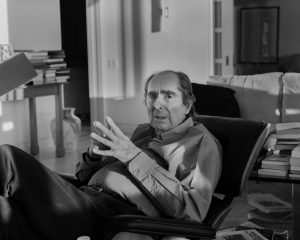Zadie Smith in The New Yorker:
 One time, I was having a conversation with Philip Roth about lane swimming, a thing it turned out we both liked to do, although he could swim much farther and much faster. He asked me, “What do you think about as you do each length?” I told him the dull truth. “I think, first length, first length, first length, and then second length, second length, second length. And so on.” That made him laugh. “You wanna know what I think about?” I did. “I choose a year. Say, 1953. Then I think about what happened in my life or within my little circle in that year. Then I move on to thinking about what happened in Newark, or New York. Then in America. And then if I’m going the distance I might start thinking about Europe, too. And so on.” That made me laugh. The energy, the reach, the precision, the breadth, the curiosity, the will, the intelligence. Roth in the swimming pool was no different than Roth at his standing desk. He was a writer all the way down. It was not diluted with other things as it is—mercifully!—for the rest of us. He was writing taken neat, and everything he did was at the service of writing. At an unusually tender age, he learned not to write to make people think well of him, nor to display to others, through fiction, the right sort of ideas, so they could think him the right sort of person. “Literature isn’t a moral beauty contest,” he once said. For Roth, literature was not a tool of any description. It was the venerated thing in itself. He loved fiction and (unlike so many half or three-quarter writers) was never ashamed of it. He loved it in its irresponsibility, in its comedy, in its vulgarity, and its divine independence. He never confused it with other things made of words, like statements of social justice or personal rectitude, journalism or political speeches, all of which are vital and necessary for lives we live outside of fiction, but none of which are fiction, which is a medium that must always allow itself, as those other forms often can’t, the possibility of expressing intimate and inconvenient truths.
One time, I was having a conversation with Philip Roth about lane swimming, a thing it turned out we both liked to do, although he could swim much farther and much faster. He asked me, “What do you think about as you do each length?” I told him the dull truth. “I think, first length, first length, first length, and then second length, second length, second length. And so on.” That made him laugh. “You wanna know what I think about?” I did. “I choose a year. Say, 1953. Then I think about what happened in my life or within my little circle in that year. Then I move on to thinking about what happened in Newark, or New York. Then in America. And then if I’m going the distance I might start thinking about Europe, too. And so on.” That made me laugh. The energy, the reach, the precision, the breadth, the curiosity, the will, the intelligence. Roth in the swimming pool was no different than Roth at his standing desk. He was a writer all the way down. It was not diluted with other things as it is—mercifully!—for the rest of us. He was writing taken neat, and everything he did was at the service of writing. At an unusually tender age, he learned not to write to make people think well of him, nor to display to others, through fiction, the right sort of ideas, so they could think him the right sort of person. “Literature isn’t a moral beauty contest,” he once said. For Roth, literature was not a tool of any description. It was the venerated thing in itself. He loved fiction and (unlike so many half or three-quarter writers) was never ashamed of it. He loved it in its irresponsibility, in its comedy, in its vulgarity, and its divine independence. He never confused it with other things made of words, like statements of social justice or personal rectitude, journalism or political speeches, all of which are vital and necessary for lives we live outside of fiction, but none of which are fiction, which is a medium that must always allow itself, as those other forms often can’t, the possibility of expressing intimate and inconvenient truths.
Roth always told the truth—his own, subjective truth—through language and through lies, the twin engines at the embarrassing heart of literature. Embarrassing to others, never to Roth. Second selves, fake selves, fantasy selves, replacement selves, horrifying selves, hilarious, mortifying selves—he welcomed them all. Like all writers, there were things and ideas that lay beyond his ken or conception; he had blind spots, prejudices, selves he could imagine only partially, or selves he mistook or mislaid. But, unlike many writers, he did not aspire to perfect vision. He knew that to be an impossibility. Subjectivity is limited by the vision of the subject, and the task of writing is to do the best with what you have. Roth used every little scrap of what he had. Nothing was held back or protected from writing, nothing saved for a rainy day. He wrote every single book he intended to write and said every last thing he meant to say. For a writer, there is no greater aspiration than that. To swim all eighty-five lengths of the pool and then get out without looking back.
More here.
